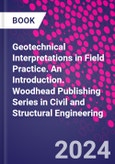Geotechnical Interpretations in Field Practice: An Introduction provides the latest on field test results and theoretical knowledge, interpretation and engineering judgement and how this data is essential for proper planning and execution of ground investigations. Maximum subsurface information can be extracted with lesser budget if proper interpretation is made. In other words, no amount of site investigation is adequate without proper interpretation and application of engineering judgement. With this in consideration in mind, this book presents a special focus on the importance of interpretation and engineering judgment in geotechnical projects.
Please Note: This is an On Demand product, delivery may take up to 11 working days after payment has been received.
Table of Contents
1. Introduction
2. Detection of subsurface anomalies
3. Engineering judgement in field tests
4. Limitations of field tests
5. Project management without technical knowledge
6. Consequences of incomplete reporting
7. Reaching a conclusion in geotechnical failures
8. Ignoring site conditions in laboratory
9. Memory of excavated soil or rock
10. Project specific suitability of a strata
11. Overlooking the subsurface strata
12. Field recording of a geotechnical engineer
13. Interpretations of drilling data
14. Simulation of a site condition
15. Investigation steps in case of complex subsurface condition
16. Selecting suitable ground improvement method for a problematic site
17. Interpretation after a geotechnical failure
18. Excuses after a geotechnical failure
19. Interpretation of geotechnical reports
20. Interpretation without a conclusion








